
Edward II, the first English monarch to be deposed, ruled from 1307 to 1327 and is renowned for his intimate association with Piers Gaveston. This connection has sparked considerable debate among historians, with modern scholars increasingly accepting the likelihood of a romantic relationship between the two. A medieval chronicler once described Edward's affection for Gaveston as 'beyond measure,' and another noted Edward's fondness for certain vices, suggesting a more profound connection than mere friendship.
The Royal Shakespeare Company (RSC) is reviving Christopher Marlowe's play that dramatizes this historical narrative. Marlowe, an Elizabethan playwright rumored to be a heretic, a spy, and possibly queer, brought this story to the stage with remarkable openness. His play, Edward II, explores themes of love and power, with Marlowe weaving queer elements throughout the narrative.
The Play's Bold Themes
In Marlowe's Edward II, the character of Gaveston speaks of the King's affection in terms that go well beyond platonic friendship. He expresses willingness to swim across the Channel, evoking the myth of Leander, just to be reunited with his beloved Edward. Such grand declarations are rarely made for mere friends.
Upon their reunion, Edward's tender words to Gaveston, urging him to embrace rather than kiss his hand, underline the deep bond they share. The play leaves little room to doubt the nature of their relationship, despite historical attempts to downplay its significance.
Cultural Impact and Reception
The RSC's current production of Edward II at the Swan Theatre pushes these themes to the forefront, showcasing the love between Edward and Gaveston as a central element. Daniel Raggett, the play's director, notes that previous adaptations often reduce this relationship to a mere physical connection, a stereotype frequently imposed on male homosexual relationships.
Raggett emphasizes the importance of portraying a fuller spectrum of queer relationships, moving beyond reductive tropes. This approach is particularly resonant in today's socio-political climate, which still wrestles with issues of homophobia and erasure.
Relevance in Today's World
As Daniel Evans, co-artistic director of the RSC and star of the play, points out, homophobia persists even in societies that consider themselves progressive. The play's promotional materials, featuring Edward and Gaveston's intimate moments, have provoked backlash, reflecting ongoing societal discomfort with queer representation.
Interestingly, discussions with Evans and Raggett took place during politically charged times, prompting reflections on how far LGBTQ+ rights have come and the challenges they still face. The parallels between historical censorship of queer narratives and contemporary political moves against "woke education" highlight the play's ongoing relevance.
Why This Story Matters
Raggett argues that Edward II is a tale of a king who happens to be queer, not a story solely about queerness. The play captures the complexity of human experiences—love, betrayal, loyalty, and power struggles—interwoven with queer themes, making it a rich, multi-layered narrative.
Half a millennium after Marlowe first penned the play, its messages resonate in today’s society, which at times appears to be regressing in terms of acceptance and understanding. The production serves as a reminder that queerness has always existed, persisted, and often stood as an act of protest against societal norms.
For those interested in exploring this rich intersection of history, literature, and contemporary relevance, Edward II runs at the RSC's Swan Theatre in Stratford-upon-Avon until April 5th. This production is not just a play but a celebration of diverse narratives that have shaped, and continue to shape, our understanding of love and identity.
Related Posts
Triumphant Trans Woman Wins Legal Battle and Inspires Others to Stand Up for Their Rights
Breaking new ground: a landmark victory in transgender rights After battling in courtrooms and enduring endless challenges, Diana Portillo, a transgender woman, has secured a monumental victory in her decade-long fight against workplace discrimination. The result? Nearly $1 million awarded in a historic settlement. But this isn't just a win on paper—it represents a powerful precedent in combati [...]
Pride Month in Latin America: Protests and Demands for Equality
**Celebrating Pride and advocating LGBTQ+ rights in Latin America** Pride Month in Latin America was a lively mix where celebration met activism. Communities united, not just throwing a party but making a stand—demanding equality and pushing governments toward better protection and rights recognition. Throughout Latin America, pride events erupted in marches and cultural displays, each with a c [...]
Transgender Erasure Actions Implemented by National Park Service
```html Trump administration's impact on national park service and transgender recognition The Trump administration made notable moves in undermining transgender representation, which included directing agencies like National Park Service not include "T" and "Q" when they refered “LGBTQ” in any official communication. This move seems part a broader plan by this administration aimed at reducin [...]